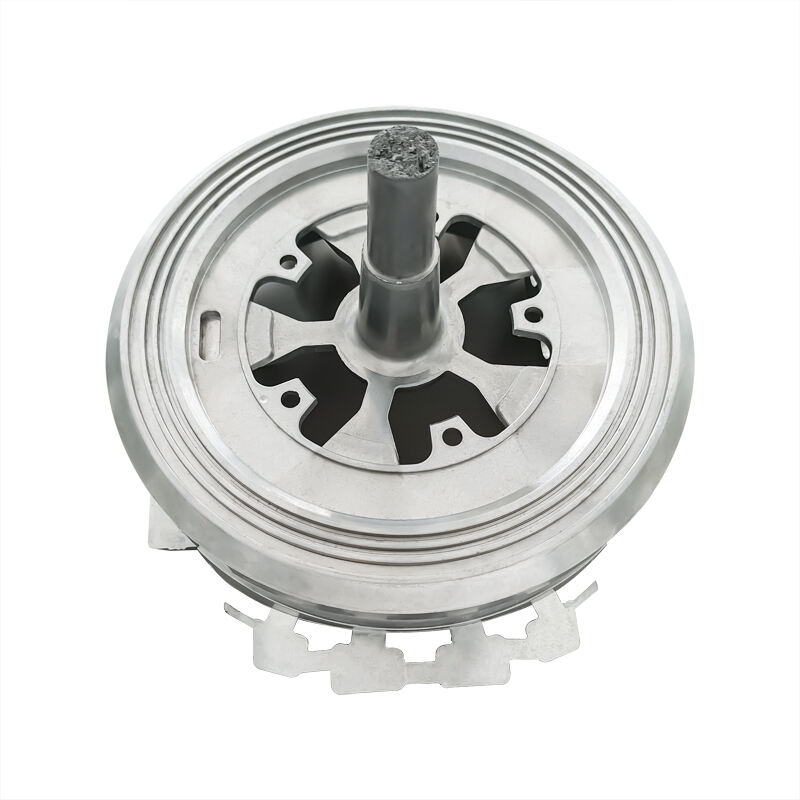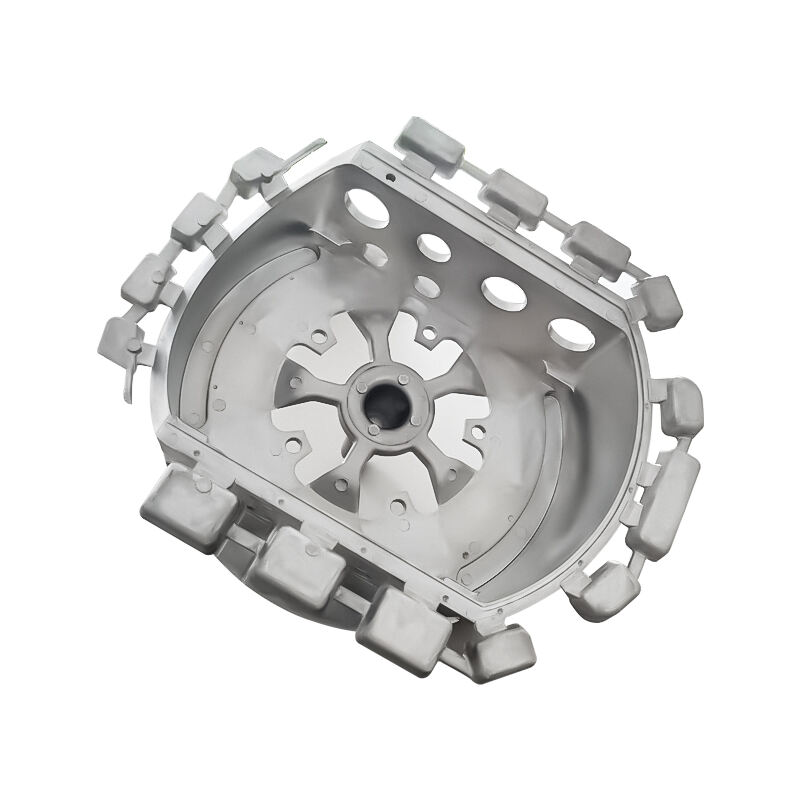Precision Engineering in Custom Die Casting
Achieving Tighter Tolerances With Custom Dies
Custom die casting allows us to engineer dies that meet stringent design requirements, achieving tolerances as precise as +/- 0.005 inches. This precision is essential for parts that demand exact fit and functionality, particularly in industries like aerospace and medical devices where high precision is non-negotiable. Advanced CAD/CAM software plays a pivotal role in this process, enabling the design and simulation of dies. This technology allows manufacturers to identify and resolve potential issues before entering production, reducing the likelihood of defects. Additionally, precision engineering significantly minimizes rework and scrap rates, translating to cost savings and a more efficient manufacturing process. This method stands in contrast to traditional techniques that may result in higher material waste and additional post-processing work.
Producing Complex Geometries Unattainable Through Traditional Methods
Custom die casting shines in its ability to produce intricate designs and complex geometries that are often unattainable through conventional methods like machining or forging. The precision offered by die casting is particularly beneficial for industries with complex design requirements, such as aerospace, automotive, and medical. By utilizing computer-aided design (CAD), we can ensure these intricate shapes are produced with exceptional accuracy. Numerous success stories in die casting highlight how custom designs have led to groundbreaking advancements in product performance and functionality. Such innovations showcase the vast potential custom die casting holds in pushing the boundaries of what's possible, setting the stage for future technological advancements in various sectors.
Minimizing Material Waste Through Precision Forming
Precision die casting techniques are instrumental in reducing material waste by adopting near-net-shape forming processes. This approach decreases the excess material typically associated with traditional casting methods. Efficiently designed dies contribute to reduced scrap rates, which can be as low as 1%, compared to rates as high as 20% in conventional processes. By optimizing production workflows and tooling, we not only conserve resources but also enhance the overall efficiency of manufacturing operations. This commitment to minimizing waste aligns with sustainability goals, emphasizing the importance of responsible manufacturing practices in today’s environmentally conscious industry landscape.
Operational Efficiency & Cost Advantages
Reduced Cycle Times for Faster Project Completion
Custom die casting is renowned for its ability to significantly shorten production cycle times. The process often delivers part cycles as short as 15 to 30 seconds, facilitating a swift turnaround for sizable orders. This efficiency stems from automated die casting technologies that outpace manual methods by a considerable margin, ensuring that manufacturers can handle larger volumes without compromising on quality. This aspect is particularly advantageous for industries requiring rapid production schedules.
Lower Labor Costs Through Automated Production Systems
Automation in custom die casting plays a crucial role in reducing labor costs. It minimizes the need for extensive manual labor, cutting operational costs by up to 30%. Additionally, automated systems increase productivity and consistency, delivering high-quality outputs. Investing in automated processes also enhances worker safety by lessening physical demands and exposure to hazardous environments. This dual benefit of cost-saving and safety makes automation an attractive choice for forward-thinking manufacturers.
Energy-Efficient Process Compared to Foundry Operations
The custom die casting process is far more energy-efficient compared to traditional foundry operations. By utilizing advanced melting and casting techniques, manufacturers can achieve energy savings of up to 60%. This efficiency reduces operational costs and lowers environmental impact, positioning custom die casting as a sustainable manufacturing option. The reduced energy consumption aligns with contemporary demands for environmentally friendly production practices, contributing to the broader sustainability goals of many industries.
Superior Surface Finish Characteristics
Net-Shape Casting Eliminating Secondary Machining
Net-shape casting is a remarkable technique that allows components to be produced precisely to their final dimensions, significantly reducing the need for additional machining. By eliminating secondary machining operations, manufacturers can effectively decrease lead times, streamlining the production process and enhancing overall efficiency. This approach not only lowers costs associated with secondary operations but also minimizes potential errors that could arise from machining, thereby ensuring higher quality components. As a result, net-shape casting is a preferred option for industries demanding precision and seamless integration of their products.
Consistent Texture for Enhanced Aesthetic Applications
Custom die casting provides the capability to produce parts with a uniform surface texture, which is essential for meeting stringent aesthetic requirements. This consistency is particularly beneficial for consumer goods and automotive components where visual appeal is critical. Advanced finishing techniques, such as sandblasting and polishing, can be integrated to further enhance the surface aesthetics without compromising the structural integrity of the parts. These options ensure that die-cast products are not only functional but also visually captivating, making them suitable for high-end applications.
Optimal Sealing Surfaces for Fluid System Components
Precision die casting plays a critical role in ensuring optimal sealing surfaces for components used in hydraulic and pneumatic systems. These systems require impeccable sealing to prevent fluid leaks and ensure the integrity of the system. By using specialized alloys and incorporating surface treatments, die casting can enhance the sealing performance and durability of these components. This precision is vital for industries where fluid management is crucial, underscoring die casting's ability to deliver reliable, high-quality parts that meet the demanding requirements of modern fluid systems.
High-Volume Production Capabilities
Mass Replication With Sub-Millimeter Consistency
Custom die casting offers the remarkable capability of producing thousands of units with sub-millimeter consistency, making it highly suitable for high-volume production across various industries. This precision is essential, especially in sectors where high-performance components are critical. It ensures each part meets exact specifications without variance, which is vital in industries such as automotive and aerospace. By integrating quality control processes, including automated measurement systems, manufacturers can guarantee that each piece adheres to stringent specifications. This commitment to precision minimizes defects and enhances overall product reliability, allowing businesses to confidently deliver consistent high-quality products.
Quick Tooling Changes for Multi-Product Manufacturing
The ability to quickly change tooling is a cornerstone of modern die casting facilities, enabling rapid shifts between projects and minimizing downtime. This flexibility is essential for companies aiming to meet dynamic market demands efficiently. With quick tooling adjustments, manufacturers can transition seamlessly between different product lines, thereby optimizing production schedules. This capability is particularly beneficial in industry environments that require sudden adaptations to consumer preferences or shifts in market trends. Ultimately, rapid tooling changes support multi-product manufacturing, allowing companies to respond promptly and effectively to diverse demands without compromising on quality or productivity.
Multi-Cavity Die Solutions for Output Maximization
Embracing multi-cavity die solutions is a strategic approach to maximize production output and reduce per-unit costs. By manufacturing multiple parts in a single cycle, companies can significantly boost their efficiency. This method is especially advantageous for fulfilling high-volume orders, where economies of scale can be achieved, thus enhancing profitability. Such die solutions not only streamline production processes but also contribute to lower material and operational costs, offering a substantial competitive edge. As businesses look to optimize production and cost efficiency, multi-cavity die solutions provide a powerful mechanism to produce larger quantities without increasing overhead expenses, supporting sustainable business growth.

Customization-Driven Performance Enhancements
Alloy Flexibility for Application-Specific Properties
Custom die casting offers remarkable alloy flexibility, allowing manufacturers to tailor material properties to specific applications. This adaptability means components can be designed to meet particular needs for strength, corrosion resistance, and weight. Developments in material science have broadened the range of alloys available, enhancing performance in challenging environments. This ensures that die casting maintains relevance across various industries where specific properties can drive performance improvements.
Integrated Features Reducing Assembly Complexity
Custom die casting excels in integrating multiple features within a single component, greatly reducing assembly complexity. By incorporating complex structures and details directly into the cast, manufacturers minimize potential failure points during assembly. This innovation leads to more compact designs and streamlined production processes, contributing to increased efficiency and reliability in final products.
Weight Optimization Through Topology-Driven Designs
Advanced design techniques such as topology optimization are revolutionizing weight management in die casting. These methods allow for creating lightweight structures that retain strength, making them ideal for aerospace and automotive industries. By reducing component weight, manufacturers can achieve significant energy savings and enhance system performance. Weight-optimized components are particularly appealing for engineering applications where efficiency is crucial.
High-Volume Production Capabilities
Mass Replication With Sub-Millimeter Consistency
Custom die casting is highly capable of mass replication, producing thousands of units with sub-millimeter consistency. This precision is ideal for industries requiring high-volume production, ensuring each component meets exacting standards. Quality control is paramount, with automated measurement systems verifying accuracy, which is vital for high-performance applications across sectors like automotive and aerospace.
Quick Tooling Changes for Multi-Product Manufacturing
Modern die casting facilities are equipped to handle quick tooling changes, allowing manufacturers to swiftly transition between different projects. This capability minimizes downtime and supports the production of various products under tight deadlines, aiding companies in efficiently meeting market demands. The flexibility of die casting tooling is key to simultaneously managing diverse production requirements.
Multi-Cavity Die Solutions for Output Maximization
Multi-cavity die solutions are an invaluable asset for maximizing output in die casting. They enable the simultaneous production of multiple parts in a single cycle, effectively boosting productivity and reducing per-unit costs. This approach is particularly beneficial for high-volume orders, where economies of scale can be realized, enhancing profitability through increased efficiency and lower material waste.
FAQ
What is precision engineering in custom die casting?
Precision engineering in custom die casting involves designing and manufacturing dies to tight tolerances, meeting specific requirements for exact fit and functional performance. It's crucial for industries like aerospace and medical devices where precision is vital.
How does custom die casting reduce material waste?
Custom die casting reduces material waste through near-net-shape forming processes, lowering scrap rates by optimizing die design and production workflows, thus conserving resources and aligning with sustainability goals.
What are the benefits of automation in custom die casting?
Automation in custom die casting lowers labor costs, improves efficiency, enhances product consistency and quality, and increases worker safety by reducing manual labor demands.

